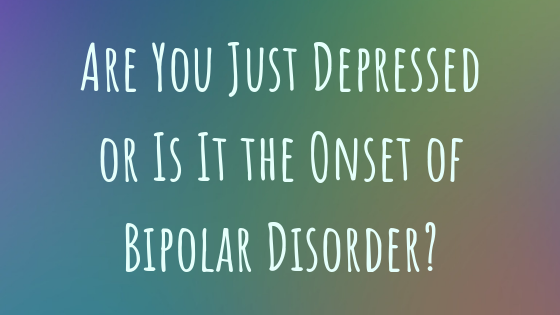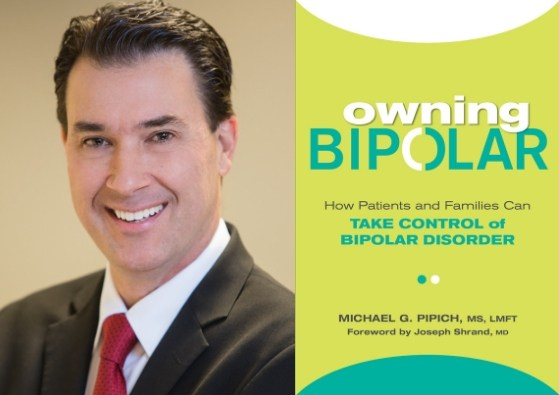
This guest post hits close to home. For twenty-one years, from ages eighteen to thirty-nine, I was diagnosed with chronic depression (dysthymia). I’d tell doctors that I was at least cyclothymic, for I my over-productive workaholism led to cyclical depressive crashes. Finally, at thirty-nine years old, I was diagnosed with bipolar disorder. — Kitt
Are You Just Depressed or Is It the Onset of Bipolar Disorder?
Michael G. Pipich, MS, LMFT
About two-thirds of people with bipolar disorder are misdiagnosed with other mental health problems before bipolar is discovered.[1] Among those individuals, a significant majority are given a diagnosis of major depression. Most people with a major depressive disorder that is unrelated to bipolar disorder (typically known as non-bipolar depression or unipolar depression) can be treated safely and effectively with a combination of antidepressant medications and psychotherapy. But when people with undetected bipolar are treated this way, a host of mental health problems can occur, making the underlying bipolar condition much worse.
It’s understandable that someone may not immediately be given the bipolar diagnosis if their first mood swing begins in a depression mood zone. This seems particularly true of people who have bipolar II disorder. And sometimes, there may be more than one depressive episode before a manic or hypomanic episode happens in a person with bipolar.
If you’re wondering about whether you may have depression or the beginning of bipolar, there are some keys to keep in mind when seeking treatment.
First of all, when assessing if your depression is a part of bipolar, know that bipolar disorder has distinct genetic foundations. In other words, it runs in families and is passed through family genes. So if you suspect that any family members may have had bipolar disorder, it’s important to inform your doctor or therapist when entering treatment. If the information is available, a thorough family mental health history can really support a proper bipolar diagnosis. Unfortunately, such information isn’t always asked for, so be prepared to volunteer all that you know during an evaluation or treatment session.
Next, your personal history of mood swings should be explored. If you’ve had severe ups and downs during childhood or adolescence, these may be more than the common tumult of growing up. They may instead be early expressions of bipolar disorder. It’s especially important to review periods of hyperactivity, bouts of unexplained rage, self-harm, or suicidal thoughts or actions that could have occurred at any time in life. There certainly may be other explanations for these, such as early life trauma or severe loss and grief experienced during these formative years. But if explosive behaviors or deep depression occurred at different times, especially with little or no provocation, it can point to underlying bipolar disorder.
Usually, most people with bipolar who seek treatment on their own are currently or recently depressed, or are experiencing consequences of untreated bipolar disorder. Any history of mania or hypomania is less obvious, however. And often, bipolar patients will either not understand manic symptoms or will avoid discussion about them. If you have had at least one occurrence in your life of intense euphoria, excitability, unexplained energy and creativity, avoidance of sleep, or impulsive behaviors, inform your treatment professional. But also bear in mind that mania and hypomania may be marked by intense periods of irritability and agitation, know as dysphoria. This is in contrast to the euphoria that most people think about with bipolar mania. Often a dysphoric type of manic or hypomanic episode can be mistaken for the kind of agitation seen in major depression. This can mislead the course of treatment to focus only on depression, while missing the full bipolar condition.
This brings us to the most important part of knowing whether you have depression or bipolar onset. According to the Diagnostic and Statistical Manual of Mental Disorders (5th edition), if a patient is given an antidepressant medication, and it produces manic symptoms, the person is then diagnosed with bipolar disorder.[2] While this is a very clear indication of bipolar, how the mania surfaces in the individual may take different forms. For example, a person in a depression mood zone can improve early in the treatment, and as a result, may not show manic symptoms right away. Any slight improvement may provide a hopeful sign that treatment is working, but when the person starts to get worse because of emerging mania—especially if it’s dysphoric—the unwitting response may be to apply more antidepressant medication. Now we have some real problems.
So, if at some point in your treatment, an antidepressant medication makes you feel more agitated, more irritable, more aggressive, or you start to experience hyperactivity or greater impulsivity, tell your treatment professional right away. This could be the start of a manic episode that is revealing a previously undiagnosed bipolar disorder. Even more importantly, any increase in suicidal thoughts or possible psychotic symptoms, such as hallucinations, should be reported immediately, as these can be life-threatening. Any antidepressants will either likely be eliminated at this point, or possibly paired with a mood stabilizing or antipsychotic drug to keep a lid on mania.
With bipolar finally recognized, bipolar medications can be introduced to decrease manic-type symptoms, while keeping depression in check. Alongside medications, it’s important to have therapy focus on the unique challenges facing people with bipolar disorder. Major depression is frequently considered an acute condition because it often can resolve in time, so medications may be discontinued at some point, along with a shorter overall approach to therapy. But bipolar disorder is a lifelong condition. Even though its symptoms can come and go in episodes, the genetic nature of the condition means the bipolar patient will need continuing care through the lifespan.
[1] Hirschfeld R. M., Lewis, L., & Vornik, L. A. (2003). Perceptions and impact of bipolar disorder: How far have we really come? Results of the National Depressive and Manic-Depressive Association 200 survey of individuals with bipolar disorder. Journal of Clinical Psychiatry, 64(2), 161–174.
[2] American Psychiatric Association. (2013). Diagnostic and statistical manual of mental disorders (5th ed.). Washington, DC: Author, 128-130.

Michael G. Pipich, MS, LMFT is a psychotherapist and author of Owning Bipolar: How Patients and Families Can Take Control of Bipolar Disorder, (Citadel Press, Sept 2018). He practices in Denver, Colorado, and can be reached at MichaelPipich.com.
Press Contact: Janet Appel Public Relations
205 West 54 Street, New York, New York 10019
212-258-2413

Leave a Reply